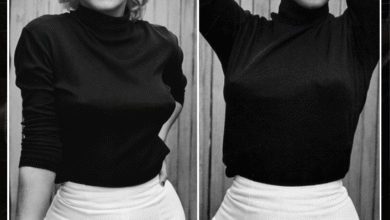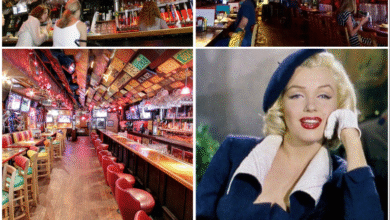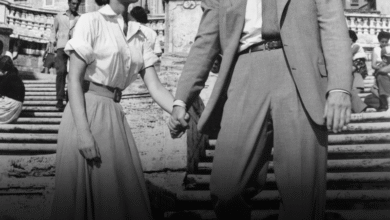Marilyn Monroe Recalls Her Biggest Career Moment—And It Almost Left Her Speechless
OPINION: This article may contain commentary which reflects the author's opinion.
Marilyn Monroe, one of the most iconic figures in entertainment history, is renowned not only for her captivating performances but also for the personal moments that shaped her career and legacy. Among the most significant events Monroe recalled in her lifetime was the unforgettable performance at President John F. Kennedy’s early birthday celebration in May 1962. This moment, which would go down in history as one of her most memorable, was recounted by Monroe in interviews, providing a rare glimpse into her thoughts and emotions during that high-pressure event.
The “Big Moment”: Singing to the President
In an interview originally published in Life magazine in August 1962, and later reprinted in The Guardian, Monroe reflected on the moment she famously sang “Happy Birthday, Mr. President” to a packed Madison Square Garden, an event that has since become one of the most talked-about moments in both her career and American pop culture. Monroe recalled feeling terrified before stepping onto the stage, saying, “I was scared to death. I was shaking all over. I was just terrified.” Her nerves were palpable as she feared that she would fail to deliver, worrying, “What if no sound comes out?”
The event was significant not just for its public nature, but also for the emotional weight it carried for Monroe. She recounted how, rather than greeting Kennedy in a formal manner, she introduced her former father-in-law, Isadore Miller, an elderly immigrant, adding a deeply personal touch to the highly publicized performance. This reflection illustrates the layers of personal and professional significance Monroe attached to the moment, marking it as a pivotal event in her life.
Iconic Performance and Backlash
Monroe’s performance that night, in a skin-tight beige rhinestone-covered dress that appeared almost nude, was met with immense attention from the press and public. Her iconic rendition of “Happy Birthday, Mr. President” was a defining moment not just in her career but in American pop culture. However, the performance was not without its consequences. Fox executives, who were already concerned about Monroe’s commitment to her work, were irked by her decision to attend the event, with some even urging her to cancel her appearance. Despite these tensions, the event remains etched in history as one of her most glamorous and controversial moments.
The gown itself became a symbol of Monroe’s allure, cementing her status as an enduring cultural figure. However, beyond the glitz and glamour, it was the emotional gravity of the moment that Monroe reflected on as her “big moment.” This sentiment was shared with The Guardian, where she emphasized the importance of this event in her life, both personally and professionally.
Comparison to Other Iconic Moments
While Monroe’s “Big Moment” in the public eye is often linked to her portrayal of iconic roles, such as the famous subway grate scene in The Seven Year Itch (1955), Monroe herself did not consider these moments to hold the same personal weight as her performance at the Kennedy event. The subway scene, often described as one of the most iconic in film history, was certainly a key moment in her career, but it lacked the deep emotional resonance that she associated with singing for the President.
Similarly, while Monroe had other significant personal and professional milestones—such as her marriages and early acting aspirations—none of these events seemed to hold the same level of emotional reflection in her public statements. In The Guardian interview, Monroe also spoke about her childhood dreams of becoming an actress, but these reflections, while revealing, did not carry the same weight as her performance for Kennedy, which marked a turning point in both her career and her personal identity as a public figure.
Emotional Impact and Legacy
The emotional impact of Monroe’s performance at the Kennedy celebration was compounded by her personal struggles and the immense public scrutiny she faced. Monroe’s reflection on the moment reveals how it transcended being a mere performance; it was an act of vulnerability, connecting her personal history with a public spectacle. The legacy of that moment, as Monroe recounted, was not just about the applause or the accolades but about the emotional resonance she felt in giving such a powerful and personal performance before the world.
Her ability to recall the fear, the nerves, and the self-doubt in the face of such a high-profile event speaks to the human side of an icon whose career was often overshadowed by her public image. Monroe’s willingness to acknowledge her vulnerability in interviews allowed the world to see a different side of the woman behind the blonde bombshell persona.
Conclusion: A Defining Moment in Monroe’s Legacy
Marilyn Monroe’s recollection of her performance at President John F. Kennedy’s birthday celebration in May 1962 stands as one of the most significant “big moments” in her life, both professionally and personally. Beyond the dazzling dress and the famous rendition of “Happy Birthday,” it was the fear, the nervousness, and the deeply personal nature of the performance that defined it for Monroe. While her other iconic roles, like her subway scene in The Seven Year Itch, remain emblematic of her career, it was her vulnerability on that stage in Madison Square Garden that marked a profound moment in her life.
As Monroe herself described, it was a time when she felt the weight of her own identity and the pressures of fame. Her willingness to recall this experience with such honesty highlights the enduring emotional depth of her legacy—proving that behind the glamour and the public persona, Marilyn Monroe was a woman who, like everyone else, grappled with fear, doubt, and the complexities of living under the spotlight.



